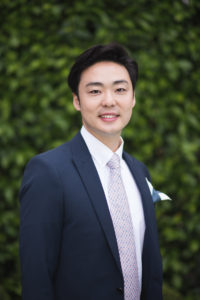Via Harvard Negotiation and Mediation Clinical Program
 HNMCP: How did you engage with alternative dispute resolution during your years at Harvard Law School?
HNMCP: How did you engage with alternative dispute resolution during your years at Harvard Law School?
Paul Yoo: One of my goals before joining HLS was to make sure I took as many ADR/negotiation courses that I could. I took the Negotiation Workshop to build my foundation and continued coursework in Dispute Systems Design and HNMCP. When I wasn’t taking classes I was a TA for Harvard Negotiate Institute, the Negotiation Workshop, or International Negotiations. I was also part of the Harvard Negotiators team that competed in an international competition in Paris. We did not win the tournament, but we won hearts and minds.
HNMCP: Can you trace any particular influences that led you to study negotiation? Given the range of clinic options available at HLS, why did you choose HNMCP
PY: I was fascinated by the art and science of negotiation when I took a conflict resolution seminar with Prof. Lee Ross during my undergraduate at Stanford University. I continued my academic interest in the space by writing a thesis on North Korea’s negotiation strategies, and knew I wanted to immediately practice negotiating once I entered law school. While I had some basic understanding of negotiations, I never comprehended what it meant to become an effective mediator before coming across what HNMCP offered to its students. From the multi-party stakeholder dynamics to the balance between client empathy and objectivity, I found mediation much more challenging than traditional negotiations. More than the course topic, however, I chose to take HNMCP because of the incredible leadership team.
HNMCP: What was both the challenges and the rewards of your project with the La Raza Roundtable?
PY: The La Raza project was one of my most memorable experiences at HLS. La Raza and former San Jose Mayor Chuck Reed had asked HNMCP to develop a stakeholder assessment during a time when tensions were high between the Latino community and the police department. The historic tension between multiple groups and the number of polarizing issues amongst them made it impossible to complete a quick mediation and was a source of significant challenge to our team. For example, La Raza felt the SJPD disproportionately targeted Latinos by arresting individuals under laws that gave the police too much discretion. Despite these challenges, the stakeholders remained dedicated and they ultimately resolved one of the more contentious issues. As a result of the HNMCP project, along with facilitation efforts by Stanford, the County of Santa Clara issued new guidelines to law enforcement declaring that driving without a license or driving with a suspended license would be processed as an infraction rather than a misdemeanor. I hope that the work HNMCP began in San Jose continues to guide how communities and police departments can develop detailed and substantive solutions to the long-standing problems we often witness in the press.
HNMCP: What were the most important skills you learned through your negotiation training?
PY: Before negotiation training, I often confused communication with speaking. I’ve come to learn that communication is about an effective exchange and connection of ideas and that is much easier to do if you’re taught how to listen through a very active method and empowering set of tools. I may not remember the design process of every dispute system or all the six steps to create value out of conflict, but the core of the approach—the act of listening for and sharing a set of interests—is something I will continuously pursue.
HNMCP: Can you give an example of when these have been useful?
PY: One of my very first projects as a management consultant fresh out of law school was to develop a negotiation strategy for a major airline. The airline’s labor contracts were all coming up for renewal and the company had historically provided its staff with generous pay and perks. The company wasn’t interested in traditional hardline tactics but was facing major increases in fuel costs and more aggressive price wars. I literally used the Handbook of Dispute Resolution and all my class notes to generate pages of creative options until we landed on a few that made sense for both sides.
HNMCP: How are you using these skills in your current work?
PY: I find myself negotiating with parties almost every single day. If I’m not in direct negotiations, I am preparing for the next one by looking at industry analysis, the direct and indirect stakeholders, and by building up my BATNA (best alternative to a negotiated agreement). I would never have been as diligent in my preparation without the mentorship I gained from HNMCP and its faculty.
Paul Yoo is the head of business development and strategic partnerships at The Honest Company. In his current role, he negotiates with distributors, retailers, licensees/licensors, and other companies to help the company grow across new industries and geographies. Prior to joining Honest, he was a senior manager at McKinsey. Paul lives in LA with his wife, Chrissy, and one-year-old son, Lucas.
Filed in: Alumni Profiles, Clinical Student Voices
Contact Office of Clinical and Pro Bono Programs
Website:
hls.harvard.edu/clinics
Email:
clinical@law.harvard.edu